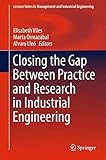Closing the Gap Between Practice and Research in Industrial Engineering [electronic resource] / edited by Elisabeth Viles, Marta Ormazábal, Alvaro Lleó.
Contributor(s): Viles, Elisabeth [editor.] | Ormazábal, Marta [editor.]
| Ormazábal, Marta [editor.] | Lleó, Alvaro [editor.]
| Lleó, Alvaro [editor.] | SpringerLink (Online service)
| SpringerLink (Online service) .
.
Material type:  BookSeries: Lecture Notes in Management and Industrial Engineering: Publisher: Cham : Springer International Publishing : Imprint: Springer, 2018Edition: 1st ed. 2018.Description: XIII, 390 p. 60 illus., 35 illus. in color. online resource.Content type: text Media type: computer Carrier type: online resourceISBN: 9783319584096.Subject(s): Industrial engineering
BookSeries: Lecture Notes in Management and Industrial Engineering: Publisher: Cham : Springer International Publishing : Imprint: Springer, 2018Edition: 1st ed. 2018.Description: XIII, 390 p. 60 illus., 35 illus. in color. online resource.Content type: text Media type: computer Carrier type: online resourceISBN: 9783319584096.Subject(s): Industrial engineeringPart 1: Strategy and Enterpreneurship -- Chapter 1. Innovative Spillovers and Efficiency in the Brazilian Industry -- Chapter 2. Supply Chain Sustainability in Spanish Major Retailer Through Strategic Alliances and Lean Practices -- Chapter 3. The Executive's Personal Characteristics Influences on the Strategic Decision-Making Process: Does the Mental Model Matter? -- Chapter 4. Components to Construct a Business Model Innovation under a Product-Service System Approach in the Aerospace Industry Through Analytical Hierarchy Process -- Chapter 5. Depicting Big Data: Producing a Technological Profile -- Chapter 6. Management, Innovation Capacity and Fear of Failure in a Sample of Spanish Firms -- Chapter 7. Sustainability Assessment of Environmentally Conscious Manufacturing Companies -- Chapter 8. Application of Innovation Management Techniques in SMEs: A Process Based Method -- Chapter 9. Assessing an Incubator Model in a Technological Centre: The Importance of the Spin-Off’s Origin -- Part II: Operations Research, Modelling and Simulation -- Chapter 10. A Novel Project Selection Scheduling Model -- Chapter 11. Resolving Product Configuration Conflicts -- Chapter 12. Forecasting Dynamics of Daily Commuting to Work from Other Municipalities to the Municipality which Change the Taxation Policy -- Chapter 13. Public-private Partnerships for Trade Facilitation: A Theoretical Model -- Chapter 14. Capacitated Lot-Sizing and Scheduling Problem for Second-tier Suppliers in the Automotive Sector -- Chapter 15. A Generic Decision Support Tool for Lot-sizing and Scheduling Problems with Setup and Due Dates -- Part III: Logistics -- Chapter 16. Application-oriented Optimization of Internal Milk-run Systems -- Chapter 17. Analysing the Fit between Innovation Strategies and Supply Chain Strategies -- Chapter 18. On the Impact of Undershoots at Order Point in the Fill Rate Estimation in Continuous Review Policies for the Lost Sales Case -- Chapter 19. The Importance of Measurement Systems in the Search for Suitable Packaging Options -- Chapter 20. How to Do Road Transport More Sustainable? A Literature Review -- Chapter 21. Total Cost of Ownership in the Context of Supply Chain Management: An Instructional Case -- Chapter 22. Tourist Route Planning with a Metaheuristic Approach -- Chapter 23. A Feasible Nurse Routing Plan for the Elderly: Quality and Spatial Trade-offs -- Part IV: Production -- Chapter 24. Minimizing Lost-Work Costs in a Mixed-Model Assembly Line -- Chapter 25. Comparative Models for Minimizing Ergonomic Risk in Assembly Lines -- Chapter 26. Time-Based Conditions for Synchronized Procurement in Douki Seisan -- Chapter 27. An Overview of Optimization Models for Integrated Replenishment and Production Planning Decisions -- Chapter 28. Optimization Models to Support Decision-Making in Collaborative Networks: A Review -- Chapter 29. Petrobras’ Investment Projects in Brazil under Checkmate: The Ghost Refineries Case -- Part V: Quality and Product Management -- Chapter 30: Relationship Between Operational Performance and Help Chain Critical Success Factors -- Chapter 31: An Alternative Test of Normality for Improving SPC in a Portuguese Automotive SME -- Part VI: Knowledge and Project Management -- Chapter 32: Definition of a Project Performance Indicators Model: Contribution of Collaborative Engineering Practices on the Project Management -- Chapter 33. The Characteristics of Workers as Mediators in Knowledge Sharing within a Company -- Chapter 34. Project Management Success Factors in Basque Companies -- Chapter 35. Integration of Constructability and Project Risk Management -- Part VII: Service Systems -- Chapter 36. Sustainability leveraged by Energy Service Projects (ESCO) in Spain: Analysis 2010-14 -- Part VIII: Industry 4.0 -- Chapter 37. Pushing the Limits of Lean Thinking - Design and Management of Complex Production Systems -- Chapter 38. Industry 4.0: A Classification Scheme -- Chapter 39. Framework for a New Wave of IT-Enabled Business Process Transformations -- Part IX: Education -- Chapter 40. Development of a Lean Assessment Tool for Small and Medium Sized-Enterprises.-Chapter 41. Project-based Learning as a Bridge to the Industrial Practice -- Chapter 42. Wiki as an Activity Learning.
This book presents the proceedings of the XXII International Conference on Industrial Engineering and Operations Management, International IIE Conference 2016, and International AIM Conference 2016. This joint conference is a result of an agreement between ADINGOR (Asociación para el Desarrollo de la Ingeniería de Organización), ABEPRO (Associação Brasileira de Engenharia de Produção), AIM (European Academy for Industrial Management) and the IIE (Institute of Industrial Engineers), and took place at TECNUN-School of Engineering (San Sebastián, Spain) from July 13th to 15th, 2016. The book includes the latest research advances and cutting-edge analyses of real case studies in Industrial Engineering and Operations Management from diverse international contexts, while also identifying concrete business applications for the latest findings and innovations in operations management and the decisions sciences.


There are no comments for this item.